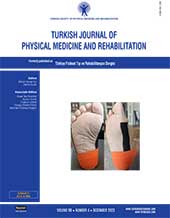The caregiver burden of informal caregivers for stroke patients with and without dysphagia: A multi-center, cross-sectional study in Türkiye
2 Department of Physical Medicine and Rehabilitation, Ege University Faculty of Medicine, Izmir, Türkiye
3 Department of Physical Medicine and Rehabilitation, Bolu Izzet Baysal Physical Treatment and Rehabilitation Training and Research Hospital, Bolu, Türkiye
4 Department of Physical Medicine and Rehabilitation, Selçuk University Faculty of Medicine, Konya, Türkiye
5 Department of Physical Medicine and Rehabilitation, Erenköy Physical Medicine and Rehabilitation Hospital, Istanbul, Türkiye
6 Department of Physical Medicine and Rehabilitation, University of Health Sciences, Ankara Dışkapı Training and Research Hospital, Ankara, Türkiye
7 Department of Physical Medicine and Rehabilitation, Gaziantep University Faculty of Medicine, Gaziantep, Türkiye
8 Department of Physical Medicine and Rehabilitation, Manisa Celal Bayar University Faculty of Medicine, Manisa, Türkiye
9 Department of Physical Medicine and Rehabilitation, Bakırköy Dr. Sadi Konuk Training and Research Hospital, Istanbul, Türkiye
10 Department of Physical Medicine and Rehabilitation, Medical Faculty of Uşak University, Uşak, Türkiye DOI : 10.5606/tftrd.2023.11894 Objectives: The aim of this study was to investigate the caregiver burden (CB) of informal caregivers for stroke survivors with and without dysphagia and to assess the relationship between the CB levels of informal caregivers for stroke survivors with dysphagia, patients` swallowing-related quality of life (QoL), and patients` stroke-specific QoL.
Patients and methods: This multi-center, prospective, cross-sectional study included a total of 120 stroke patients (76 males, 44 females; mean age: 61.1±12.3 years; range, 19 to 86 years) between October 2019 and 2020. Of the patients, 57 had dysphagia and 63 had no dysphagia. The Functional Oral Intake Scale (FOIS) was used to classify the degree of functional dietary limitation caused by each patient`s swallowing impairment. Patients and caregivers completed the Eating Assessment Tool (EAT-10), Swallowing Quality of Life (SWQoL) questionnaire, Stroke Impact Scale (SIS), and the Zarit Caregiver Burden Interview (ZBI).
Results: The CB levels were higher in those caring for stroke patients with dysphagia than in those caring for stroke patients without dysphagia. Caregiver burden was found to be associated with patients` swallowing-related QoL and stroke-related QoL. Significant predictors of high CB scores (F=2.55, R2=0.59; p=0.007) were being an employed caregiver (B=17.48, p=0.003), being a caregiver with high school (B=-19.6, p=0.03), and secondary school (B=-16.28, p=0.02) educational status, being son, daughter (B=30.63, p=0.007) or other relative of the patient (B=20.06, p=0.01), lower FOIS stage (B=-3.14, p=0.011), lower SWQoL (B=0.52, p=0.009) and lower SIS (B=-0.37, p=0.04) scores.
Conclusion: Caregivers of stroke patients with dysphagia suffer from a higher CB than those without dysphagia. In stroke patients with dysphagia, swallowing-related QoL is associated with the QoL levels of stroke patients and the CB levels of their caregivers. Employment status, educational status of caregiver, caregiver`s relativity to the patient, FOIS stage, swallowing and stroke related QoL of the patients are factors related to burden levels of caregivers of stroke patients with dysphagia. These results may help health professionals to understand dysphagia as an essential source of CB and consider it, while planning treatments.
Keywords : Caregiver burden, dysphagia, stroke

















